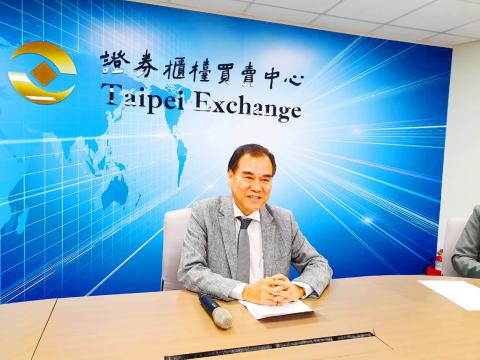Scan-D Corp (詩肯), which designs and sells teak furniture under the Scanteak brand, yesterday announced a plan to acquire 100 percent of Nova Furnishing Holdings Pte Ltd’s (諾雅家具) shares for NT$228 million (US$7.39 million).
Nova Furnishing is Singapore’s second-largest furniture retailer.
“This is Scan-D’s first acquisition in 26 years, and is an official move to enter the Asian furniture market,” Scan-D chairman Lim Pok Chin (林福勤) told a news conference at the Taipei Exchange.

Photo: CNA
“Since the Singaporean market is saturated, we aim to first target neighboring Malaysia and Indonesia,” Lim said.
Nova, which focuses mainly on the middle and low-end furniture market, has 13 stores in Singapore.
The 16-year-old firm has reported average annual revenue of NT$660 million, net income of NT$68 million and gross margin of 52 percent over the past three years.
“Nova’s past financial performance has been quite steady,” Scan-D chief financial officer and spokesperson Ho Shan-chuang (何山壯) said.
Scan-D would book the investment this quarter, but expects to recover the costs in four years given the average profit of NT$68 million that Nova could generate every year, Ho said.
Scan-D said that after six months of negotiations, the deal is expected to be completed on May 1.
The company runs 121 stores in Taiwan and has offices in the US, Japan, Germany, Singapore and Brunei.
“We have positioned Scanteak as a high-end brand. Scanteak does not use materials from China... We aim to have Nova focus on the low-end market,” Lim said.
The deal is expected to help increase Scan-D’s sales, as its monthly revenue has continued to drop annually since late last year.
In the first quarter of this year, the company’s revenue plunged 20.73 percent to NT$371.22 million, from NT$468.31 million a year earlier, company data showed.
Scan-D launches an average of 10 stores every year in Taiwan.
Kaohsiung’s growing real-estate market has also boosted furniture sales, the company said.
“Taiwan’s market is still promising. This year we will open new Scan Living (詩肯居家) stores in southern Taiwan to contribute to our business,” Lim said.
Scan Living is the company’s second brand and was launched in 2012. It features higher-end leather sofa collections and Scandinavian-style furniture.
The brand contributed 23.07 percent to the company’s total revenue in the first quarter, compared with 20.55 percent a year earlier, company data showed.
Scan-D has no plans to buy Taiwanese furniture companies for the time being, Ho said, adding that most Taiwanese want to own their own business and there is no suitable option in sight.

With an approval rating of just two percent, Peruvian President Dina Boluarte might be the world’s most unpopular leader, according to pollsters. Protests greeted her rise to power 29 months ago, and have marked her entire term — joined by assorted scandals, investigations, controversies and a surge in gang violence. The 63-year-old is the target of a dozen probes, including for her alleged failure to declare gifts of luxury jewels and watches, a scandal inevitably dubbed “Rolexgate.” She is also under the microscope for a two-week undeclared absence for nose surgery — which she insists was medical, not cosmetic — and is

GROWING CONCERN: Some senior Trump administration officials opposed the UAE expansion over fears that another TSMC project could jeopardize its US investment Taiwan Semiconductor Manufacturing Co (TSMC, 台積電) is evaluating building an advanced production facility in the United Arab Emirates (UAE) and has discussed the possibility with officials in US President Donald Trump’s administration, people familiar with the matter said, in a potentially major bet on the Middle East that would only come to fruition with Washington’s approval. The company has had multiple meetings in the past few months with US Special Envoy to the Middle East Steve Witkoff and officials from MGX, an influential investment vehicle overseen by the UAE president’s brother, the people said. The conversations are a continuation of talks that

CAUTIOUS RECOVERY: While the manufacturing sector returned to growth amid the US-China trade truce, firms remain wary as uncertainty clouds the outlook, the CIER said The local manufacturing sector returned to expansion last month, as the official purchasing managers’ index (PMI) rose 2.1 points to 51.0, driven by a temporary easing in US-China trade tensions, the Chung-Hua Institution for Economic Research (CIER, 中華經濟研究院) said yesterday. The PMI gauges the health of the manufacturing industry, with readings above 50 indicating expansion and those below 50 signaling contraction. “Firms are not as pessimistic as they were in April, but they remain far from optimistic,” CIER president Lien Hsien-ming (連賢明) said at a news conference. The full impact of US tariff decisions is unlikely to become clear until later this month

Nintendo Co hopes to match the runaway success of the Switch when its leveled-up new console hits shelves on Thursday, with strong early sales expected despite the gadget’s high price. Featuring a bigger screen and more processing power, the Switch 2 is an upgrade to its predecessor, which has sold 152 million units since launching in 2017 — making it the third-best-selling video game console of all time. However, despite buzz among fans and robust demand for pre-orders, headwinds for Nintendo include uncertainty over US trade tariffs and whether enough people are willing to shell out. The Switch 2 “is priced relatively high”